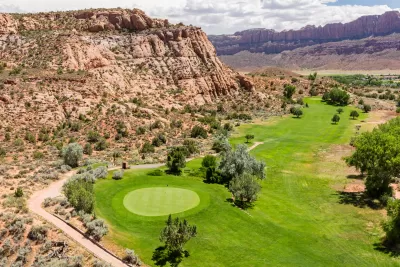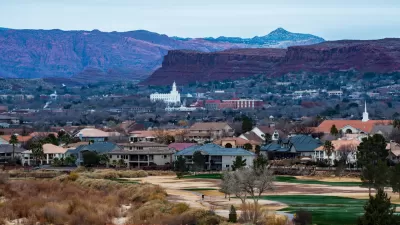Amid a growing water crisis, more cities are cracking down on ornamental uses of grass and golf course greens.

As water in the Southwest becomes an increasingly scarce resource, cities with high water usage are being forced to rethink their priorities. In St. George, Utah, one of the fastest-growing cities in the country, golf has long been one of those priorities, writes Samuel Shaw in High Country News.
As Shaw explains, “St. George’s water rates are among the lowest in the West, which results in bigger profits for course operators and more affordable green fees, but also disincentivizes conservation.” And keeping golf courses green year round in the hot, arid desert environment takes around 177 million gallons of water per year for each course—“roughly eight times the national average.”
The popularity of golf in the area and historically low water costs are taking their toll. “Few cities in the Southwest use more water per person: nearly 300 gallons a day. And a hefty portion of that, over half, goes to keeping ornamental grass, lawns and golf courses lush in an arid region where water supplies are dwindling every day.”
But the tide may be turning against the sacrosanct sport and the wasteful use of water: “In 2022, the city of Ivins, an exurb of St. George, effectively banned the construction of new golf courses, while early this year, state Rep. Douglas Welton, R, introduced House Bill 188, which could require golf courses to be more transparent about how much water they use.” For now, the city has passed new water conservation ordinances. Elsewhere in the Southwest, Las Vegas passed some of the strictest conservation measures, targeting ornamental uses and golf courses.
FULL STORY: In the Utah desert, can golf justify itself?

Planetizen Federal Action Tracker
A weekly monitor of how Trump’s orders and actions are impacting planners and planning in America.

DARTSpace Platform Streamlines Dallas TOD Application Process
The Dallas transit agency hopes a shorter permitting timeline will boost transit-oriented development around rail stations.

Congressman Proposes Bill to Rename DC Metro “Trump Train”
The Make Autorail Great Again Act would withhold federal funding to the system until the Washington Metropolitan Area Transit Authority (WMATA), rebrands as the Washington Metropolitan Authority for Greater Access (WMAGA).

Supreme Court Ruling in Pipeline Case Guts Federal Environmental Law
The decision limits the scope of a federal law that mandates extensive environmental impact reviews of energy, infrastructure, and transportation projects.

Texas State Bills to Defund Dallas Transit Die
DART would have seen a 30% service cut, $230M annual losses had the bills survived.

Bikeshare for the Win: Team Pedals to London Cricket Match, Beats Rivals Stuck in Traffic
While their opponents sat in gridlock, England's national cricket team hopped Lime bikes, riding to a 3-0 victory.
Urban Design for Planners 1: Software Tools
This six-course series explores essential urban design concepts using open source software and equips planners with the tools they need to participate fully in the urban design process.
Planning for Universal Design
Learn the tools for implementing Universal Design in planning regulations.
Roanoke Valley-Alleghany Regional Commission
City of Mt Shasta
City of Camden Redevelopment Agency
City of Astoria
Transportation Research & Education Center (TREC) at Portland State University
US High Speed Rail Association
City of Camden Redevelopment Agency
Municipality of Princeton (NJ)





























